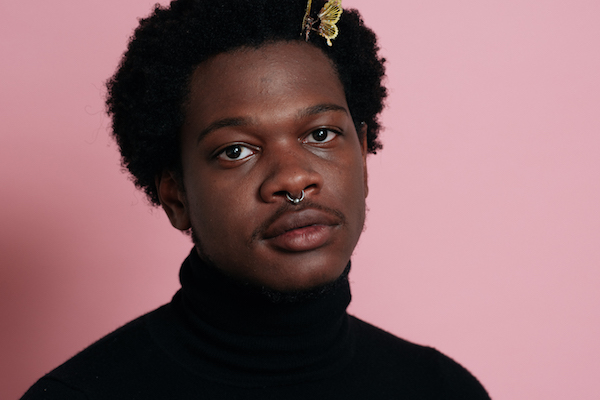
BY STEVE ERICKSON | Genderqueer artist Shamir has made one of the more radical transformations in recent music. He followed up his 2015 debut album, “Ratchet,” which was steeped in ’80s house music and dance club-oriented beats, with “Hope,” a collection of rock songs self-released as a free download to the website SoundCloud that seemingly consisted of him singing and playing guitar into a cheap tape recorder. Instead of singing sexually explicit lyrics about “ratchet guys,” Shamir was now covering the obscure ’90s Boston indie rock band the Blake Babies.
He is now definitively a rock artist, and while his new album “Revelations” is far more polished than “Hope,” it continues down the same path in a more thoughtful manner.
Shamir suffers from bipolar disorder, and “Hope” was the result of a particularly difficult weekend, during which he contemplated leaving the music industry. At the age of 23, he has already recorded one EP and three albums. XL, the large indie label that released “Ratchet,” is the current home of Radiohead and the xx, the former home of Vampire Weekend (who have had several #1 albums and sold hundreds of thousands of albums), and puts out Adele’s music in the UK, although it licenses it to Sony here. The label could have made Shamir into a star, but he chafed at its expectations.
When he became more interested in rock music than dance music, he upset the label’s marketing plans and, implicitly, stereotypes about race and sexuality. Queer African Americans who sing about sex with men, in our culture, are not supposed to pick up guitars, despite the fact that rock ‘n’ roll was invented by African Americans. This struggle with XL over his musical direction, as well as the fact that “Ratchet” got major promotion from the label but didn’t sell according to its expectations, led to Shamir being dropped.
He has re-emerged on a quite small indie label.
I have the impression that Shamir now feels ambivalent at best about “Ratchet,” but I think it still stands up as a pretty good album, particularly in its integration of ’80s acid house influences into a sound that is modern. It was very well-received by critics two years ago, and in fact I put the opening song “Vegas” on my list of 2015’s best singles. Apart from his falsetto vocals, “Ratchet” and “Revelations” don’t sound like the work of the same artist at all. But when Shamir ended “Ratchet” with “KC” — a ballad played on acoustic guitar — that might have been an early indication he didn’t just want to sing over dance beats.
In retrospect, the rawness of “Hope” sounds like a cry for help. Shamir seems to be in a healthier place now, but he has settled into a new genre with his new album, especially the album closer and centerpiece, “Straight Boy.” And he has also taken complete control over his music. With the exception of “ ’90s Kids,” on which he worked with a co-writer, Shamir wrote all the songs, produced, played all the instruments, and mixed the entirety of “Revelations.”
On “Straight Boy,” Shamir sings, “The trust I give isn’t given to me, and the hate inside is all I see… All straight boys care about is how they’re viewed from the outside.” The song may have been inspired by unrequited affection toward straight men, but it expands from there into a much larger and extremely biting critique of heterosexual masculinity. The original music video for it expanded this critique even further into an attack on racism and the erasure of queer people of color. Alas, it was pulled when its director and actor Ryan Carpenter was accused of sexual assault, replaced by a simple clip of Shamir saying, “Fuck sexual abuse. Fuck rapists.” — and then singing and playing the song on acoustic guitar.
Fittingly for an artist who identifies as non-binary, Shamir’s voice on “Games,” the keyboard-driven opening track of “Revelations,” sounds like it could be either male or female. His production and arrangements are a lot less slick and detailed than the sound on “Ratchet”; many songs consist of relatively simple, loud guitar riffs over a drum machine.
But across genres, his songwriting skill and personality remain. The first full rock song on “Revelations,” “You Have a Song,” is a deeply cynical dig at a fellow musician. “ ’90s Kids” insists on respect for Millennials, whom older people have a tendency to gratuitously slam the way Baby Boomers used to do to Generation X, but I think Shamir is largely speaking about himself when he describes “paralyzing anxiety” and being “out here struggling.” The album’s most accessible song, its combination of rhythm guitar, piano, and drum machine evokes ’70s glam-rock.
The sense of despair that was apparent everywhere on “Hope” is kept at bay on “Revelations,” but just barely. Throughout, Shamir’s lyrics strain to stay positive and his vocals often adopt a bitter and sarcastic edge. Is the world ready for a queer African American rocker who is willing to share his issues with the world and, implicitly most of the time and explicitly in the “Straight Boy” video, spell out what degree of responsibility racism and homophobia bear for them? One senses that he may have deliberately backed away from the shot at stardom “Ratchet” at least theoretically offered in favor of a quieter life far from the spotlight. In any case, he’s now obviously making music on his own terms.
Shamir’s “Revelations” is available via Father/Daughter Records (fatherdaughterrecords.com; $9-$12).



























